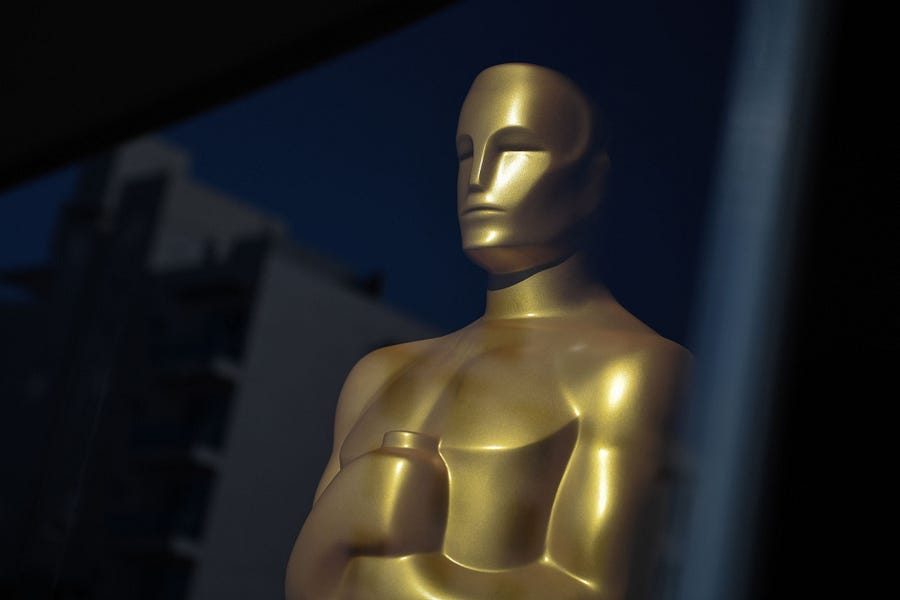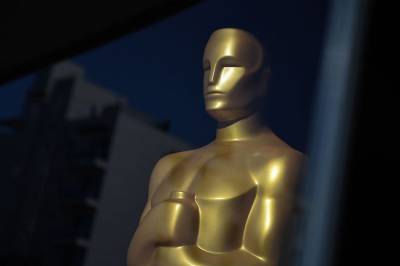The Academy of Motion Picture Arts and Sciences convenes next Sunday to announce the winners of its annual awards. The big award for the night is, of course, the Oscar for Best Picture. Ten films have been nominated this year, but as anyone who has ever watched the Oscars can attest, a nomination isn’t always proof of quality. Fortunately, The Dispatch staff is here to break down the nominees for you (with some help from some friends), and help you figure out what’s actually worth watching.
I love musicals. Before iPhones or even iPods, my best friend and I would while away the hours seeing how much of Rent we could sing from memory. And Into the Woods. And Chess. I say all of that to explain how much I was looking forward to Steven Spielberg's remake of West Side Story and how utterly disappointed I was. It wasn't bad. The cinematography and choreography was mesmerizing at times. Ariana DeBose's talent can't be contained. But there was so much that was tragically mediocre and limited.
The reason the story has endured for more than 2,000 years—from Pyramus and Thisbe to Romeo and Juliet to Tony and Maria—is that it is about the tension between time and timelessness. It is at its core about youth—itself a factor of time—and the arrogance and naiveté of two young people believing that they can escape the world they were born into and being inextricably drawn back into it. For sure, the original movie had serious flaws. The original musical did too. After all, it was supposed to be a story about Jews and Catholics that was too hastily turned into a story about Puerto Rican immigrants.
But in a story that is supposed to be about the consequences of enforcing the narrow prejudices of our own time, Spielberg couldn't help but layer some 21st century moralizing onto their 1950s world. There's a transgender character. Large chunks of the dialogue are in Spanish without subtitles. The Jets aren't just neighborhood bullies; their white supremacy is both emphasized and excused as being the result of absent fathers and unemployment. The changes weren't just distracting. The characters became smaller as they tried to carry a muddled narrative across the finish line.
One silver lining? Baz Luhrmann's 1996 Romeo and Juliet—set in an ambiguous time and place with no larger message to attend to—becomes all the more impressive for its ability to let the beauty and tragedy and the universality of their story speak for itself.
Jonah Goldberg shares his thoughts on Don’t Look Up, available to stream on Netflix.
I can’t speak to whether every Best Picture nomination is well deserved because I haven’t seen many of this year’s crop. But I did see Adam McKay’s Don’t Look Up and I can confidently say it didn’t deserve to be nominated. While not without its funny moments and entertaining performances, the Netflix film fails—fatally—at what it sets out to do. Billed as cutting satire on par with Being There or Doctor Strangelove, Don’t Look Up isn’t remotely in their league.
The premise of the film is that a giant comet is barreling toward Earth, and both the media and our political leaders are incapable of taking the threat seriously. “Clearly,” McKay told GQ, the movie is an “analogy or an allegory for the climate crisis.” I have no objection to such satire, even from a radically apocalyptic perspective. But for the satire work, the story needs to hew as close to reality as possible, and there’s nothing remotely realistic about how anybody reacts to the threat. By all means, mock the New York Times and cable news, but the idea that the Times would drop its coverage of the impending demise of all life on the planet because the story didn’t sufficiently trend on Twitter isn’t clever—it lacks anything like the verisimilitude that makes the best parody funny.
By his own admission, McKay wants the audience to believe that the central sin of the mainstream media is that it doesn’t cover climate change enough and when it does, it doesn’t fear-monger the issue as much as he would like. If you work from such false assumptions, it’s almost impossible to cut deeply, as all good satire does. Indeed, the film’s best satirical moments are better suited for the anti-vaccine crowd, but these feel like improv bits thrown into the plodding and heavy-handed scripted allegory. I would say don’t pay to watch it, but if you subscribe to Netflix you already have. So watch it if you're curious, but don’t expect more than a handful of guffaws.
Will Smith should win the Oscar for Best Actor. His performance in King Richard—with apologies to fans of Wild Wild West—might be the best of his career. He doesn’t just play Richard Williams, father of Venus and Serena Williams, he embodies the role. Every little mannerism, how Richard Williams walks, how he talks, his slight hunch; it’s all there. The movie—executive produced by the Williams sisters themselves—follows Richard’s attempts to turn his daughters into tennis superstars, fighting racism, poverty, and even some gang members along the way. It’s a heartwarming and mostly true telling of Williams’ life, though some mythologizing does occur—the film doesn’t include any of Richard’s infidelity and barely mentions his abandonment of his children from his first marriage.
For whatever it leaves out, Will Smith gives a stirring performance, capturing much of Williams’ complex, often difficult nature. He’s the ultimate sports parent, obsessive and controlling, with a 40 page plan for his daughters’ future that he wrote before they were even born. But he’s also a loving father who wants to create a future for his daughters that the world denied him. It’s a story that couldn’t have been written any better if it had been crafted by Hollywood screenwriters, the perfect fodder for a moving sports drama.
Guy Denton shares his thoughts on Drive My Car, available to stream on HBO Max.
Among Western critics, quiet human dramas have become Japanese cinema’s most lauded export. But despite the acclaim films such as Departures (2008), Harmonium (2016), and Shoplifters (2018) have enjoyed in recent years, there is little thematic or artistic variety between them. Ryusuke Hamaguchi’s Drive My Car is the latest in this line of finely crafted yet familiarly frustrating explorations of family and grief. It concerns Yūsuke (Hidetoshi Nishijima), a theater director and actor struggling to overcome the loss of his wife and the conflicting emotions he felt toward her before her death. When Yūsuke encounters a similarly troubled woman while staging a production of Chekov’s Uncle Vanya, they confront their inner turmoil together.
In superficial terms, Drive My Car is exemplary. Hamaguchi’s direction evokes the prose of Yasunari Kawabata: vivid but minimalistic. The film offers radiant lighting and rich, varied scenery as it traverses the whole of Japan, where modern houses from a Muji catalog contrast with sprawling rural greenery. The performances are faultlessly convincing, delivered with what clearly would have required rigorous practice, and the dialogue, though mannered, is intriguingly candid. Like Kawabata, Hamaguchi’s style is informed by poetry. As the film progresses, verbal and visual echoes between scenes become increasingly common, reflecting the development of Yūsuke’s mental state.
But in a film this subdued, technical proficiency is meaningless without emotional resonance, and Drive My Car is ultimately too labored to successfully affect. A three-hour runtime is invariably an intimidating site, and in this case, it is wholly unnecessary. Hamaguchi extends scenes needlessly, and with an hour removed, the film could offer the same dramatic weight. Moreover, for its length, Drive My Car offers few fresh ideas. Hamaguchi’s contemporaries have explored many of the film’s subjects exhaustively before him, and the film’s unique literary allusions are diminished by its insistence on explaining their meaning to the audience. Drive My Car is a beautiful journey going nowhere fast.
Michael Reneau shares his thoughts on Nightmare Alley, available to stream on HBO Max.
Despite Martin Scorsese’s prodding in the pages of the Los Angeles Times, an Oscar-winning director, and a cast brimming with talent, Nightmare Alley came up well short of box office expectations: It raked in less than $38 million against a $60 million budget.
So goes it for a film that faced COVID-19 delays, stiff Marvel competition, and a decidedly dark tone befitting modern-day noir, based on the 1946 novel of the same name by William Lindsay Gresham.
Bradley Cooper plays Stanton Carlisle, a man running from a mysteriously traumatic past but who quickly turns from meandering drifter to carnival grifter. It’s more than 11 busy minutes into the two-and-a-half hour film before we hear Carlisle speak, and it’s to a geek—the carnie wild man whose “man or beast?” performance of catching and eating a live chicken barehanded was often the biggest draw for a traveling carnival.
Carlisle is simultaneously disgusted and fascinated by the non-performance performance—carnival workers often exploited alcoholics and addicts, keeping them caged and hooked on booze or drugs, then throwing them in a stupor in front of an audience. He soon discovers his own talent for manipulation as a mentalist, convinces romantic interest Molly (Rooney Mara) to hit the road as part of his act, and hits the big time.
But Carlisle’s belief in his own abilities to deceive—to “find out what they’re afraid of and sell it back to them,” as Cate Blanchett’s femme fatale puts it—lands Carlisle in trouble with a wealthy tycoon.
The poor box office draw shouldn’t detract from the achievements of director Guillermo del Toro. He and his crew created the post-Depression carnival world of their characters, rich with grit and depravity. The pacing and script at times drag, but Cooper—and several others in the supporting cast—deliver perfectly noir performances.
“When a man believes his own lies, starts believing that he has the power, he’s got shuteye,” a carnie has-been tells Carlisle at one point. “Because now he believes it’s all true. And people get hurt. … No man can outrun God, Stan.”
Caleb Parker shares his thoughts on The Power of the Dog, available to stream on Netflix.
My problem with Jane Campion’s adaptation of The Power of the Dog had more to do with my expectations going into it than what Campion gave us. I should confess, I did not read Thomas Savage’s 1967 novel that the movie is based on or watch a single trailer going into the movie theater. “Benedict Cumberbatch makes a western” is how the movie was pitched to me. Cumberbatch is a fantastic actor who gave us a modern Sherlock Holmes and an Oscar-nominated turn as World War II hero Alan Turing. And when I think western I think Clint Eastwood, Gary Cooper, and John Wayne; I think of classics like Unforgiven, High Noon, and True Grit. So I was excited walking into my local DC Alamo Drafthouse. That excitement was misplaced.
If you’re reading this, and don’t want any spoilers, this is where you should stop. The Power of the Dog is a slow burn. It’s the story of brothers Phil and George Burbank. George marries Rose Gordon. Phil does not like Rose. Phil struggles with his sexuality. Phil is mean to Rose and her son Peter. And it takes two long hours to tell this story. This psychological drama may be for some, but when you go in expecting to watch Cumberbatch try his hand at the genre that gave us The Good, the Bad and the Ugly, this is not the movie you expect to see.
Academy voters have better options this year.
Ryan Brown shares his thoughts on Belfast, available to rent on Amazon, Apple TV, and Google Play.
Belfast is going to win Best Picture at the Oscars. I know I’m not the first one to say it, but if it does not win the Oscar this year I will be the first one to demand a recount of the vote because it deserves it. I haven’t seen the other films, but Belfast hits on every single emotion a person can have in its 98 minutes: fear and hope, joy and sadness, and, most prominent in the movie, hate and love. It is beautifully shot and well written, leaving you wanting more yet somehow endlessly satisfied with the last hour and a half of your life.
The movie opens with a heartwarming scene of the small neighborhood in Belfast where all the main characters live. Catholic and Protestant children alike are all playing, people are riding bikes, having a “wee” laugh, and just enjoying the rare sunny day. Then, a massive protest breaks out and everything changes. Belfast tells the story of a Protestant family living in Northern Ireland during “The Troubles.” But the movie is much more than that. It really is three different love stories happening at the same time and at all different stages of life.
I admit, as someone who comes from a family that is very proud to be Irish, I’m biased toward any movie set in Northern Ireland or Ireland. (If you haven’t seen Waking Ned Devine do so right now!) But I don’t think I’m alone in thinking this movie deserves all of the praise it has gotten. If you haven’t seen it yet, go watch it so you can feel just as much joy as I know I will when it wins Best Picture.
Guy Denton shares his thoughts on Licorice Pizza, available to rent on Amazon, Apple TV, Google Play, and YouTube.
In Licorice Pizza, Paul Thomas Anderson, never predictable in his output, has remade Once Upon a Time in Hollywood in the style of Richard Linklater. This bubbly, ambling voyage through the San Fernando Valley eschews a conventional narrative in favor of a vivid atmosphere and an unusual cast of characters. Helmed by a lesser director, the film could easily buckle under its own sense of pointlessness, but in Anderson’s adroit hands it consistently delights.
Licorice Pizza’s premise is admittedly bizarre. In 1973, Gary Valentine (Cooper Hoffman), a 15-year-old child actor on the cusp of irrelevancy, falls in love with 25-year-old Alana Kane (Alana Haim), a photographer’s assistant struggling to find direction in life. They develop a friendship that inevitably grows into something deeper while the oil crisis, Watergate, and the sexual revolution unfold in the background. Haim and Hoffman are effortlessly convincing in their theatrical debuts, and seem poised for immense future success. Beyond Sean Penn and Bradley Cooper, Anderson rounds out his cast with reliable character actors rather than A-list megastars, and the result is a hilarious array of performances. Harriett Samson Harris is her usual devilishly charming self as a mercurial talent agent, while John Michael Higgins is perfectly obnoxious as an offensive restaurateur. The actors are supported by a lushly filmed L.A. landscape and a soundtrack of magnificently curated pop songs, which Anderson allows to linger as scenes unfold rather than inserting them in snippets.
What’s most refreshing about Licorice Pizza is that its historical setting is not exploited. Though Anderson clearly views the ‘70s with sentimentality, no aspect of the film exists to please its audience purely by reminding them of the past. Like Tarantino’s Hollywood fairytale, Anderson’s film is sprinkled with references to cultural entities and famous figures of its time, both obscure and obvious. But these serve an entirely new story bursting with vibrant imagination and defined by peculiar occurrences. Throughout, Anderson maintains a consistently warm tone, evocative of youthful exuberance and aspiration. Licorice Pizza is one of the year’s most thoroughly pleasant films; a sweet treat confected for those of an appropriately sunny disposition.
Jack Butler shares his thoughts on Dune, available to stream on HBO Max.
It is a common caricature of the Academy Awards that each award is not necessarily given to the “best” in a given category, but to what has demonstrated the “most” of it: e.g., Best Actor for the actor who channeled the most scenery-chewing/prosthetics-wearing/method-acting into his or her performance. This isn’t entirely true. But this year, the Academy would be wise to award the movie that is both the “most” and the “best” picture of the nominated films: Denis Villeneuve’s Dune. It will have the chance to do so, as Dune was nominated for ten Academy Awards, including Best Picture—but quite curiously and unjustly excluding Best Director for Villeneuve, who, with this film and other recent efforts (Arrival, Blade Runner 2049) has established himself as arguably the premier interpreter of science fiction in film working today.
An adaptation of Frank Herbert’s 1965 sci-fi epic, Dune is an instantly transportive, immersive, and impeccably constructed journey to a place and time both wholly alien to our own and somehow strikingly familiar, with its political machinations centered around control over a vital resource. With the help of an impressive crew behind the camera—a score by Hans Zimmer, cinematography by Greig Frasier—and in front of it—Timothee Chalamet as central character Paul Atreides, Oscar Isaac and Rebecca Ferguson as his mother and father, Stellan Skaarsgard as the villainous Baron Harkonnen—it is the adaptation Dune fans have long awaited. Indeed, in one sense, we will continue to wait until 2023: If there is one criticism to be made of Dune, it is that, despite my remarks above, I was only left wanting more, as Villeneuve rather abruptly bisected the film’s story. But that’s no problem here: The Academy can award Dune: Part Two Best Picture as well.
Alec Dent shares his thoughts on CODA, available to stream on Apple TV.
CODA reminds me of 2019’s The Peanut Butter Falcon, both in style and in message. Both films seek to show that the lives of those with disabilities are just as rich and full as those without, and encourage viewers to stop viewing persons with disabilities as “other.” Coda follows the Rossi family, a lower class family of fishers in Massachusetts who are all deaf with the exception of daughter Ruby, presenting an intimate and moving portrait of the family’s life and struggles.
Ruby serves as the film’s protagonist; she’s a senior in high school and struggles with her parents’ and brother’s constant reliance on her as an interpreter. Ruby harbors a love for singing and joins the school choir, a pastime of which her family is dismissive despite her incredible talent. The film follows Ruby through the typical growing pains of high school, and the unique struggles of being a CODA: a child of deaf adults.
Emilia Jones shines as Ruby, and her lack of a Best Actress nomination from the Academy is criminal. The Academy did recognize Troy Kotsur, however, whose performance as Ruby’s father is moving and humorous and whose nomination is well deserved. CODA is, unfortunately, the kind of movie that the Academy likes to nominate but not award: It’s neither a big cinematic picture nor is it a pretentious drama. It’s a small, intimate film, a beautiful affirmation of the value of all life that may not win the Oscar, but will win your heart.










Please note that we at The Dispatch hold ourselves, our work, and our commenters to a higher standard than other places on the internet. We welcome comments that foster genuine debate or discussion—including comments critical of us or our work—but responses that include ad hominem attacks on fellow Dispatch members or are intended to stoke fear and anger may be moderated.
With your membership, you only have the ability to comment on The Morning Dispatch articles. Consider upgrading to join the conversation everywhere.